Parrish Lantern's Casebook
Malt Whisky Drinking, Single Speed Bike Racing, Poetry Loving, Book-Fiend, & If This Makes Me Seem Cool, It's All In The Edit.
~~~
The Ideal Library Symbolizes Everything a Society stands for. A Society Depends On Its Libraries To Know Who it Is, Because Libraries Are Societies Memory (A. Manguel). This Is My Attempt To Construct My Ideal library.
CHARLES SIMIC ~ New and Selected Poems{1962–2012}
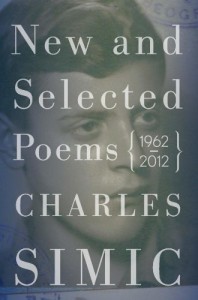
This anthology covers a span fifty years and close to four hundred poems, distilling Simic’s life’s work combining poetry from his earliest writing through to his later work, featuring seventeen new, never before published poems and around thirty revisions. Tracing the path of this writer from a newly arrived immigrant through to the heartlands of America, on the way tracing it’s history through the blues & jazz, it’s folktales and urban myths. Charles Simic’s tale is that of America, not the one defined by the Madison Avenue, but by those individuals hollering on street corners, or praying knelt at the back of an empty church for just one more night, it’s that moment one second away from madness, when the lens focuses, shifts and the light refracts onto a new strange tableaux, before restoring itself to the same sidewalk, on the same street in the same town, USA. This is a collection of poetry by one of America’s most celebrated poets, spanning over thirty collections and offering the reader the opportunity of experiencing the full range of this poets oeuvre and the chance to retrace the career of one of the most prolific and yet unique voices in contemporary literature.
Funny French & Frantic
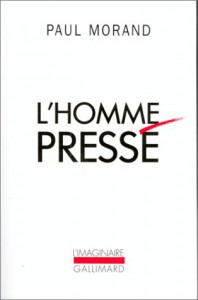
Paul Morand, who was admired by both Ezra Pound and by Marcel Proust as a pioneer craftsman of Modernist French prose. Paul Morand was born in Paris in 1888. After studying at the École libre des sciences politiques, he joined the diplomatic corps, serving in London, Rome, Berne and Bucharest.Tender Shoots his first collection of stories was introduced by Marcel Proust. He wrote poetry, novels, short stories and travel books. Due to his collaboration with the Vichy government during WWII, he was refused admission to the prestigious Académie Française three times before being finally accepted in 1968, despite the protests of Charles de Gaulle.
The Man in a Hurry, is also Pushkin press's first hardcover & although it's not essential to the reading of the book, they have created a wonderful looking book that still manages to follow the elegant style of their previous titles
The Embroidered Armour - Roberto Peregalli,
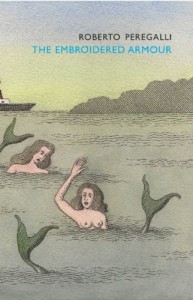
The Embroidered Armour, explores ancient Greek thought through it’s mysteries, mythology and legends demonstrating how these heralded a revolution in thinking between the time of Homer (800 BC -701 BC) and that of Plato 427 BC - 347 BC) which gave birth to the Western cultural tradition. In the introduction Peregalli relates that for the Greeks “seeing is knowing” stating that for this reason they are known as “the people of the eye”. In around a hundred and sixty pages he presents his argument concerning the modernity of “ancient” Greek wisdom, following the timeline set between the two poles of Homer and Plato we travel through the world of the gods and onto the works of Pindar, Heraclitus, Hippocrates, Aeschylus, andAristotle. Combining these with thoughts from the likes ofNietzsche, Auerbach, Rilke, Heidegger & Chantraine , he shows the modernity inherent in “ancient” Greek Thought.
Quote
The words “true” (a-lethes) and “invisible” (a-delon) are at the same time mirror images and opposites. But their connection is evident: the negation of hiddenness certifies its existence. If that which is visible is true, it is also true that truth has its origin in that which cannot be seen. In the Greek world it is thus the ambiguous essence of truth which from the outset connects the visible and the invisible.
The Ritual of Writing on Air
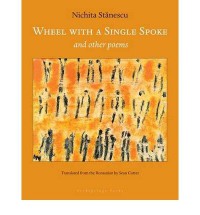
Nichita Stănescu (niˈkita stəˈnesku) was born Nichita Hristea Stănescu on 31st March 1933 in the city of Ploiesti (ploˈjeʃtʲ ) the county seat of Prahova County in the historical region ofWallachia, Romania, located about 35 miles north of Bucharest. His mother Tatiana Cereaciuchin, fled from Russia and in 1931 married Nicolae H. Stănescu, which was something he commented on several times, stating that he had been given life by a Romanian peasant and a Russian woman. Ploiesti was overrun by Nazi’s during the 2nd world war because of it’s oil refinery, which was eventually put out of commission by United States bombers.Nichita finished high school in Ploiesti, before moving to Bucharest to study Romanian, linguistics, philosophy, and literature. In 1952 he married Magdalena Petrescu, although this was to last only a year and in 1957 he graduated. His literary debut was in the Tribuna literary magazine, followed by his debut poetry collection Sensul iubirii (The Aim/Sense of Love*) in 1960, this was a collection of love poems which explore the meaning of love.Poems from the volume were previously published in the Tribuna, no. 6, 17 March 1957, and Gazeta literară, no. 12, 21 March 1957.
End Of An Air Raid
(April 5, 1944)
You dropped your chalk
and the splintered door beat against the wall
<<>>
the sky appeared, partly hidden
by the spiders
that fed on murdered children.
<<>>
Someone had taken away
the walls
……….and fruit tree
………………….and stairs.
<<>>
You hunted after spring
impatiently, like you were expecting
a lunar eclipse.
<<>>
Towards dawn, they even took away
the fence
you had signed with a scratch,
so the storks would not lose their way
when they came
this spring.
On June 6th 1962, he married for the second time, to Doina Ciurea, the marriage seems to have lasted for only two years although it wasn’t till the around 1981 that they divorced and Stănescu married for the third time in 1982 to Dora (Theodora bran) whom he had met in 1978 when she was a student in Philology, in the Department of French. Throughout this period Stănescu was a contributor to and editor of Gazeta Literară, România Literară and Luceafărul, as well as creating a extensive body of poetry, essays and Romanian translations of poets such Adam Puslojic and Vasko Popa. He also was the recipient of numerous awards for his verse, the most important being theHerder Prize in 1975 and a nomination for the Nobel Prize in 1980.
Beyond the dry as bone nature of the facts, Nichita Stănescu comes across as an outgoing gregarious individual, he seems to dispel the image of the lone writer working at his craft, preferring the company of others. He spent most of his time residing in the homes of his friends, enjoying copious amounts of drink and could regularly be found improvising poems whilst his audience attempted to follow him and transcribe them at the bar. In fact the title of this post is called “ The Ritual Of Writing On Air”because that was how he described his technique, drawing inspiration from his immediate environment, and using that to craft his verse, stating in a Belgrade interview that:
“Gutenberg flattened words out, but words exist in space … Words are spatialized. They are not dead, like a book. They are alive, between me and you, me and you, me and you. They live; they are spoken, spatialized, and received”
<<>>
While.
And yet, I have seen a bird
lay eggs while it flew --
And yet, I have seen someone cry
while he laughed --
And yet, I have seen a stone
while it was --
<<>>
In 1983 he died in Fundeni Hospital (Bucharest) after a liver condition he had had for some time worsened. He was posthumously elected a member of the Romanian Academy, although by this point he had a reached an envious position where both the critics and the general public had declared him as one of the most loved and prominent writers in the Romanian language, a language that he had himself declared was “Divinely Beautiful”.Despite living through the second world war and Romania’s fall into an oppressive police state under the dictatorship of Nicolae Ceauşescu, a regime characterized by an increasingly brutal and repressive apparatus and, by some accounts, the most rigidly Stalinist regime in the Soviet bloc. Stănescu was considered a metaphysical rather than a political poet, using this approach to examine the universe and humanity’s place within it, using various perspectives to voice the fundamental questions of his and our time. Also by walking a line between what could and could not be said, he crafted a new aestheticfor his verse, one that in his own words:
“ while the poems, often lapidary, appear to indicate a sublimation of the senses, a tendency to crystallize into a symbol, an attentive reading unveils the opposite process, that is the symbol’s subtle disaggregation, its incorporation into matter, something like the fissuring into a star of a pane of glass, broken by an invisible stone”
Meaning from the star, we notice the pane and intuit the stone. The pane registers the lines of fissure, which we might take as the lines of the poem, moving through the human language. We move from metaphor – the broken glass as star – toward the material yet abstract world, the stone that cannot be directly described in human language. (Taken from the translator’s afterword)
A Virtual Love is an old, old tale told in new way, it is a tale of love and deception, but spun from new cloth,

Those that have followed me for a while or that do so across the various forms of social media, are probably aware that my real? name is not Parrish or Parrish Lantern. Those that have checked out my "about page" will also know how a I came by this pseudonym. Like a lot of individual's over the years I've had a few alter egos that - like "Parrish" - have been what I have described as my Spiderman, Batman, or Silver surfer (choose one) superhero guise, by this I mean they represent a facet of my personality I like to think of as set free from those every day realities that shadow our personas, free from the 9-5 mentality that pays for the Spiderman costume. I raise this issue now because of a book sent to me by the writer and fellow blogger Andrew Blackman.
Jeff Brennan has multiple online personalities and finds switching between them easier than dealing with his mundane offline existence. Jeff, depending on who he is dealing with can be a caring grandson, a bored IT consultant, avid gamer or committed eco warrior, it is this last one that completely changes his life. Whilst on a protest with a friend he meets the gorgeous Marie, a young American woman who works with the homeless. After the protest Jeff and Marie are introduced to each other and she, who on hearing his name, mistakes him for a famous, yet reclusive political blogger of the same name. Jeff decides to go along with this as a ruse to get a date with Marie, but as they fall in love and develop a relation, he has to come up with increasingly more desperate measures to keep the illusion alive. This all comes to a head when the reclusive blogger decides to attend a protest and introduces himself to Marie. I won’t divulge any more of the story, I will just leave you with some questions.
Will Jeff & Marie’s relationship survive this?
Will Jeff survive this?
How will famous Jeff deal with the other Jeff?
How will Andrew Blackman tie all the ends together ?
<<>>
All this and much more make up the final section of this book and how Andrew brings it all together is as much fun as the book itself. A Virtual Love is an old, old tale told in new way, it is a tale of love and deception, but spun from new cloth, spun from Nano technology. In the modern world, where a great part of an individual’s life is played out on Facebook, Twitter, Pinterest, Librarything, booklikes or Goodreads etc. Where people whose interaction is more online whether this is purchase or play, what needs to be remembered - is how we relate to others and how we perceive those relations. In a world where one can form authentic relationships without physically meeting, one needs to occasionally remember that like all relationships - how you would like to be treated is how you should treat others. A Virtual Love is a great fun read that makes you smile whilst leaving you with a lot of questions.
The Detour ~ Gerbrand Bakker
A woman arrives from the Netherlands and sets up home in a remote farm she rents from a local. She says her name is Emilie and that she is a lecturer researching the life on Emily Dickinson (1830 – 1886). On arrival she inherits the responsibility for ten geese, but slowly one by one they disappear with the chief suspect being a fox. We learn that the reason she has left her homeland and come to this remote farm is that her life back home had become unbearable after she confessed to an affair with one of her students, which resulted in her loosing her post after it became common knowledge.
Back in the Netherlands her husband, who after a jealous outburst which involved accidently setting fire to her office, has formed a strange partnership with the police officer sent to arrest him and now they are both on her tail. Unaware of any of this Emilie meets a young man who appears to have injured himself whilst out walking his dog, he initially stays the night, but ends up staying a lot longer forming a strange relationship with Emilie.
It is very hard to describe what is happening in this book, for one thing very little does happen, meaning what you do reveal would need to be covered in spoiler alerts. More important is the realisation that what happens, very little of it is on the surface, it is as though you arrived in a mystery with only part of the facts and that for all your attempts to dig deeper – your only reward is hints, innuendo, and sly suggestion. Making this a book full of strange undercurrents of what ifs and whys, that like some dissonant background music constantly raises your awareness to this tales ambiguities, bringing with it a realisation that isn’t a tale or rural Wales with the protagonist living the good life in some primrose embroidered cottage.
Although this may be an escape to the country but from what and why? It also makes you conscious that despite what you are reading, there is so much left unsaid, so much that you are not being told. Making this a book that happens more within your head, than it does on the page, leaving you with nothing but those hints and innuendos as your means to interpret what happens on the page.
This is a strange quirky little book that skirts around issues of isolation and inner turmoil, that demurely screams it’s angst at life's tribulations. This is a quiet tragedy shot through with a dry humour that pierces all the angsts and obfuscation like the sun through the clouds on a welsh hillside.
Since reading this book which was on the International Foreign Fiction Prize longlist, it made the cut and is now shortlisted which is wonderful, as it definitely deserves to be there, not just for the tale but also for David Colmer’s translation which made this book a beautiful and seamless read.
The Anthologist
 If you love poetry, you will love this book, no prevarication, You Will Love This Book. If poetry was a joy, a love that you put aside as childish whimsy, this will re-introduce you to that love, will spark a curiosity, that will combust to no mere bonfire in your heart.
If you love poetry, you will love this book, no prevarication, You Will Love This Book. If poetry was a joy, a love that you put aside as childish whimsy, this will re-introduce you to that love, will spark a curiosity, that will combust to no mere bonfire in your heart.
Departure
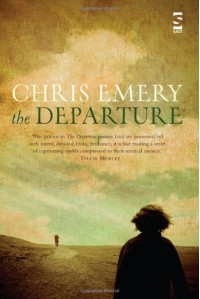 This, being my first poetry related post of 2013, I thought I’d aim high and start with an individual who’s not just a great poet, but also happens to be a director of Salt, an independent publisher of a wide range of genres: from literary biography and memoir, to plays, theatre studies, literary studies, cultural and landscape studies, companions, monographs and writer’s guides, as well as a core publishing activity in literary fiction, short stories and poetry. Salt has won numerous awards and in 2012 had one of their writers shortlisted for the Man Booker prize with Alison Moore’s The Lighthouse . As I said, aiming high.Whilst I'm aiming high I'm going to steal a quote by another fabulous poet, as my link into this book. George Szirtes, states on the back cover that the poems in this collection:“ are like highly compressed short stories that we enter at high speed. Once in, the place is full of vivid detail keeping our head turning.”I’ve taken this to mean that Chris Emery drops you right into his poems/world, and once in you have very little chance to orientate yourself before being assaulted by the next image or poem; voices and fragments of lives hurtle past you leaving behind ghosts on the retina, neurons fired and blipping beyond the moment. Again taking Szirtes idea of “compressed stories” I recently wrote a post on a microfiction collection, and stated that I wasn't sure where the difference between prose poetry and microfiction lie and that “like prose poetry, microfiction appears to be loose, possibly random paragraphs and to use everyday language, although it is heightened, making every word placed - placed with a specific purpose - as if it were a puzzle & could have only been placed there, would only fit there.” , this description seems to fit Chris’s poetry and even though he’s far to adventurous to remain in one form when he could be exploring Sonnets, Couplets, Haiku’s or free verse, I think the description an apt one.On leaving Wale Obelisk (for Jen).Did we shuck our suits that leaf-dense noon? Leave serious careers in lemon light, the high clouds, early swallows, the day moon weakened, nothing farmed, nothing tightabove the summer marriage of grasses, and all that luscious time receding in the corporate years’ climbing excesses, just a vacancy before the children?We made a kind of love pledge there. It leaves you in chromatic episodes like this doesn't it? Not quite nostalgia but who could have imagined ageing like this?We had climbed up to lie on the piled hay, the tow-coloured earth all nice and neat, what with everything that’s come our way we’re still breathing in that smashed-up wheatOn researching for this post, I read that this poet’s work is characterised by a dystopian vision of the world, having read only this and Dr Mephisto, I can say there is an element of that, but if Chris paints the world as a dystopian, he paints it with a humour that cuts giant swathes through the darkness, highlighting the dissonance in modern living and with a language that makes me smile, makes me laugh, then makes me want to read again.Dandelions.I like your plainness in the gravel, tucked sideways in the manky cracks you look like a dishcloth flattened in those corners where the pointing has come out. You don’t resist, but still endure along the sagging rec. You’re often sat next to a dog turd with lots of beetles caring. Everything is forlorn in your colourless zone.Take all those small relinquishments at your unnoticed day rate. Suddenly you are there, reminding us of seeping middle age, going to seed in some midsummer miners’ estate with no friends or music. Perhaps you are this militant scum? The bits we don’t need beneath the sun, somehow wielding a fantastic ordinary face.You never go away. When I spot you being flagrant I am usually emerging from a colossal boredom into buoyant ideas of the extraneous. You are meant to bethe perfect emblem of the wasted. Your gift is being extra. When you brighten at dusk, spotting the panicking social scrub under eight floors of life tapestry, we hear your prayers: ‘Given up but still here’ and ‘You get up, you get on with it’, which is nearly likely really.
This, being my first poetry related post of 2013, I thought I’d aim high and start with an individual who’s not just a great poet, but also happens to be a director of Salt, an independent publisher of a wide range of genres: from literary biography and memoir, to plays, theatre studies, literary studies, cultural and landscape studies, companions, monographs and writer’s guides, as well as a core publishing activity in literary fiction, short stories and poetry. Salt has won numerous awards and in 2012 had one of their writers shortlisted for the Man Booker prize with Alison Moore’s The Lighthouse . As I said, aiming high.Whilst I'm aiming high I'm going to steal a quote by another fabulous poet, as my link into this book. George Szirtes, states on the back cover that the poems in this collection:“ are like highly compressed short stories that we enter at high speed. Once in, the place is full of vivid detail keeping our head turning.”I’ve taken this to mean that Chris Emery drops you right into his poems/world, and once in you have very little chance to orientate yourself before being assaulted by the next image or poem; voices and fragments of lives hurtle past you leaving behind ghosts on the retina, neurons fired and blipping beyond the moment. Again taking Szirtes idea of “compressed stories” I recently wrote a post on a microfiction collection, and stated that I wasn't sure where the difference between prose poetry and microfiction lie and that “like prose poetry, microfiction appears to be loose, possibly random paragraphs and to use everyday language, although it is heightened, making every word placed - placed with a specific purpose - as if it were a puzzle & could have only been placed there, would only fit there.” , this description seems to fit Chris’s poetry and even though he’s far to adventurous to remain in one form when he could be exploring Sonnets, Couplets, Haiku’s or free verse, I think the description an apt one.On leaving Wale Obelisk (for Jen).Did we shuck our suits that leaf-dense noon? Leave serious careers in lemon light, the high clouds, early swallows, the day moon weakened, nothing farmed, nothing tightabove the summer marriage of grasses, and all that luscious time receding in the corporate years’ climbing excesses, just a vacancy before the children?We made a kind of love pledge there. It leaves you in chromatic episodes like this doesn't it? Not quite nostalgia but who could have imagined ageing like this?We had climbed up to lie on the piled hay, the tow-coloured earth all nice and neat, what with everything that’s come our way we’re still breathing in that smashed-up wheatOn researching for this post, I read that this poet’s work is characterised by a dystopian vision of the world, having read only this and Dr Mephisto, I can say there is an element of that, but if Chris paints the world as a dystopian, he paints it with a humour that cuts giant swathes through the darkness, highlighting the dissonance in modern living and with a language that makes me smile, makes me laugh, then makes me want to read again.Dandelions.I like your plainness in the gravel, tucked sideways in the manky cracks you look like a dishcloth flattened in those corners where the pointing has come out. You don’t resist, but still endure along the sagging rec. You’re often sat next to a dog turd with lots of beetles caring. Everything is forlorn in your colourless zone.Take all those small relinquishments at your unnoticed day rate. Suddenly you are there, reminding us of seeping middle age, going to seed in some midsummer miners’ estate with no friends or music. Perhaps you are this militant scum? The bits we don’t need beneath the sun, somehow wielding a fantastic ordinary face.You never go away. When I spot you being flagrant I am usually emerging from a colossal boredom into buoyant ideas of the extraneous. You are meant to bethe perfect emblem of the wasted. Your gift is being extra. When you brighten at dusk, spotting the panicking social scrub under eight floors of life tapestry, we hear your prayers: ‘Given up but still here’ and ‘You get up, you get on with it’, which is nearly likely really.
The Car Thief
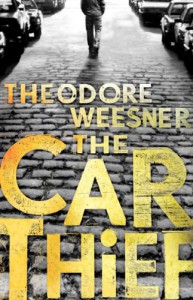 Buick Riviera. The Buick, coppertone, white sidewalls, was the model of the year, a '59, although the 1960 models were already out. Its upholstery was black, its windshield was tinted a thin color of motor oil. The car's heater was issuing a stale and odorous warmth, but Alex remained chilled. He had walked several blocks through snow and slush, wearing neither hat nor gloves nor boots, to where he had left the car the night before. The steering wheel was icy in his hands, and he felt icy within, throughout his veins and bones. Alex was sixteen; the Buick was his fourteenth car.This is our introduction to the hero of this book, although in reality this sixteen year old boy is less rebel without a cause, more lost without a compass bearing. Alex has no understanding of why he steals cars beyond a restlessness, an ache for something different than the life he has. “Billy don't like it living here in this town He says traps have been sprung long before he was born He says "hope bites the dust behind all the closed doors And pus and grime ooze from its scab-crusted sores There's screaming and crying in the high-rise blocks" It's a rat trap, Billy, but you're already caught And you can make it if you want to or you need it bad enough You're young and good-looking and you're acting kind of tough Anyway it's Saturday night, time to see what's going down Put on a bright suit, Billy, head for the right side of town It's only eight o'clock, but you're already bored You don't know what it is, but there's got to be more You'd better find a way out, hey, kick down that door It's a rat trap, and you've been caught” *Alex Housman is intelligent, yet school holds no interest for him, he lives with his father in a part of town that, if he had friends, he would be to ashamed to take them. His father has moments of sobriety between his alcoholic normality whilst still holding down a job working the second shift at the local Chevy plant. Alex spends an awful amount of time by himself, struggling with feelings that bubble & boil just below the surface, or else he buries them behind the wheel of a stolen car. The inevitable happens and he is arrested, as both Alex and reader knew he would be. Taken to a detention home, he finds himself locked up with no idea of a release date. Confined, with no way to escape or hide from himself, forces Alex to confront his feelings & acts as a catalyst. We follow Alex as he faces this moment and the issues that arise from it, until an event both horrific & yet ultimately freeing sends him off on a path that will define his life.http://parrishlantern.blogspot.co.uk/2012/07/the-car-thieftheodore-weesner.html*This is part of a single called Rat Trap written by Bob Geldof of The Boomtown Rats, it reached #1 in the UK singles charts in November 1978
Buick Riviera. The Buick, coppertone, white sidewalls, was the model of the year, a '59, although the 1960 models were already out. Its upholstery was black, its windshield was tinted a thin color of motor oil. The car's heater was issuing a stale and odorous warmth, but Alex remained chilled. He had walked several blocks through snow and slush, wearing neither hat nor gloves nor boots, to where he had left the car the night before. The steering wheel was icy in his hands, and he felt icy within, throughout his veins and bones. Alex was sixteen; the Buick was his fourteenth car.This is our introduction to the hero of this book, although in reality this sixteen year old boy is less rebel without a cause, more lost without a compass bearing. Alex has no understanding of why he steals cars beyond a restlessness, an ache for something different than the life he has. “Billy don't like it living here in this town He says traps have been sprung long before he was born He says "hope bites the dust behind all the closed doors And pus and grime ooze from its scab-crusted sores There's screaming and crying in the high-rise blocks" It's a rat trap, Billy, but you're already caught And you can make it if you want to or you need it bad enough You're young and good-looking and you're acting kind of tough Anyway it's Saturday night, time to see what's going down Put on a bright suit, Billy, head for the right side of town It's only eight o'clock, but you're already bored You don't know what it is, but there's got to be more You'd better find a way out, hey, kick down that door It's a rat trap, and you've been caught” *Alex Housman is intelligent, yet school holds no interest for him, he lives with his father in a part of town that, if he had friends, he would be to ashamed to take them. His father has moments of sobriety between his alcoholic normality whilst still holding down a job working the second shift at the local Chevy plant. Alex spends an awful amount of time by himself, struggling with feelings that bubble & boil just below the surface, or else he buries them behind the wheel of a stolen car. The inevitable happens and he is arrested, as both Alex and reader knew he would be. Taken to a detention home, he finds himself locked up with no idea of a release date. Confined, with no way to escape or hide from himself, forces Alex to confront his feelings & acts as a catalyst. We follow Alex as he faces this moment and the issues that arise from it, until an event both horrific & yet ultimately freeing sends him off on a path that will define his life.http://parrishlantern.blogspot.co.uk/2012/07/the-car-thieftheodore-weesner.html*This is part of a single called Rat Trap written by Bob Geldof of The Boomtown Rats, it reached #1 in the UK singles charts in November 1978
Light Boxes
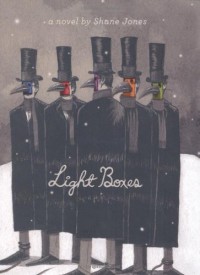 Thaddeus Lowe, lives with his wife, Selah, and their daughter, Bianca, in a small town that appears to be unnamed. For some reason an individual called February has decreed that it should remain winter for all time, so for the last three hundred days this demiurge has imposed a perpetual February upon this town and it’s environs, everything is dull, dark & grey, highlighted only by the frigid white of the snow as it drops from the leaden clouds that circle like crows overhead. On top of this he has also banned “Flight”, that means anything that can – Balloons, Flying machines, Kites, in fact he goes further anything, ANYTHING that has or possesses the ability to fly will be destroyed. His priests “for whenever such a being appears, instantaneously followers sprout from the soil they walk on”, haunt the town, stopping off at the school & library “They confiscated textbooks, tore out pages about birds, flying machines, Zeppelins, witches on brooms, balloons, kites, winged mythical creatures. They crumpled up paper airplanes the children had folded and they dumped the pages into a burning pit in the woods”. Any reference to flight is NOT allowed in February’s world as proclaimed by the Great man himself. Also Children are vanishing.Thaddeus and his family, silently protest. Filling their home with images of flight hidden inside cupboards and on the undersides of crockery, even easily covered body parts are hennaed with complex kite patterns, their tails forming an intricate constellation as though an armour to ward off February’s onslaught. His wife makes concoctions of mint tea, salves, fill their bath with this herb, and make a soup.Selah’s Mint Soup8 cups chicken stock, 2 cups mint leaves 3 large eggs 1/2 teaspoon salt 1/4 teaspoon pepperHoping that this herb will protect them, and for a while it seems to work. At some point Thaddeus meets The Solution, a group of former balloonists who wear strange bird masks and who are planning to revolt against February, they have chosen Thaddeus to be their leader, to assist them in their war against the demiurge for the sake of his family, Thaddeus dreamt of “two miniature suns. I set one each upon their foreheads I dreamed a waterfall and a calm lake of my arms below to catch them” As The Solution then leave “walking, dreaming of flying in separate directions”. Shortly after agreeing to lead the rebellion, his daughter Bianca, disappears, “Before daybreak, Thaddeus smells smoke and honey coming from Bianca’s bedroom. In her room he notices the window is open and snow is blowing in.He throws the covers off the bedHe looks around the room.He looks under the bed.He looks in the closet.He looks in the hallway.He looks at his feet.He looks at the bed. He looks at the bed.Bianca's bed is a mound of snow and teeth.Bianca is gone.Apparently kidnapped from her bed. Now on a total war footing, Thaddeus & The Solution, try different tactics to defeat February, these range from pretending spring has arrived & ignoring the freezing conditions, hoisting poles to destroy the clouds & creating this elaborate system to carry boiling water to melt the snow – all fail in the end & anger February.This is a book that is strange, beautiful, quirky, that is absurd, eccentric, that I could plough through a multitude of thesauri and still only offer you morsels, an amuse-bouche from a fine dining experience. Light Boxes is a book of poems, chants, and notes, of mantras & magic, of lists, of love & hate. This is also a book that will divide, some will love its use of different fonts, font-sizes, lists & formats, the fact that some pages contain merely a sentence & others a catalogue of names, others these same devices will annoy. For me this was wonderful, the look, the feel of the book, everything from the artwork to the poetry inside, enchanted and beguiled me. Lee Rourke in his fantastic book “A Brief History of Fables” described it as a contemporary fable & as such it has the ability to “ Shed light on whatever it is we look at, because it speaks to us in the same way that all good fables do, no matter how far-fetched or magical and hallucinatory they at first may seem: in a language we can truly understand” .I’ll leave the last word on this beautiful and heart-rending poetic fable, myth, novel (?) to February.“I wanted to write you a story about magic. I wanted rabbits appearing from hats. I wanted balloons lifting you into the sky. It turned out to be nothing but sadness, war, heartbreak. You never saw it, but there’s a garden inside me.” my link texthttp://parrishlantern.blogspot.co.uk/2012/08/light-boxesshane-jones.html
Thaddeus Lowe, lives with his wife, Selah, and their daughter, Bianca, in a small town that appears to be unnamed. For some reason an individual called February has decreed that it should remain winter for all time, so for the last three hundred days this demiurge has imposed a perpetual February upon this town and it’s environs, everything is dull, dark & grey, highlighted only by the frigid white of the snow as it drops from the leaden clouds that circle like crows overhead. On top of this he has also banned “Flight”, that means anything that can – Balloons, Flying machines, Kites, in fact he goes further anything, ANYTHING that has or possesses the ability to fly will be destroyed. His priests “for whenever such a being appears, instantaneously followers sprout from the soil they walk on”, haunt the town, stopping off at the school & library “They confiscated textbooks, tore out pages about birds, flying machines, Zeppelins, witches on brooms, balloons, kites, winged mythical creatures. They crumpled up paper airplanes the children had folded and they dumped the pages into a burning pit in the woods”. Any reference to flight is NOT allowed in February’s world as proclaimed by the Great man himself. Also Children are vanishing.Thaddeus and his family, silently protest. Filling their home with images of flight hidden inside cupboards and on the undersides of crockery, even easily covered body parts are hennaed with complex kite patterns, their tails forming an intricate constellation as though an armour to ward off February’s onslaught. His wife makes concoctions of mint tea, salves, fill their bath with this herb, and make a soup.Selah’s Mint Soup8 cups chicken stock, 2 cups mint leaves 3 large eggs 1/2 teaspoon salt 1/4 teaspoon pepperHoping that this herb will protect them, and for a while it seems to work. At some point Thaddeus meets The Solution, a group of former balloonists who wear strange bird masks and who are planning to revolt against February, they have chosen Thaddeus to be their leader, to assist them in their war against the demiurge for the sake of his family, Thaddeus dreamt of “two miniature suns. I set one each upon their foreheads I dreamed a waterfall and a calm lake of my arms below to catch them” As The Solution then leave “walking, dreaming of flying in separate directions”. Shortly after agreeing to lead the rebellion, his daughter Bianca, disappears, “Before daybreak, Thaddeus smells smoke and honey coming from Bianca’s bedroom. In her room he notices the window is open and snow is blowing in.He throws the covers off the bedHe looks around the room.He looks under the bed.He looks in the closet.He looks in the hallway.He looks at his feet.He looks at the bed. He looks at the bed.Bianca's bed is a mound of snow and teeth.Bianca is gone.Apparently kidnapped from her bed. Now on a total war footing, Thaddeus & The Solution, try different tactics to defeat February, these range from pretending spring has arrived & ignoring the freezing conditions, hoisting poles to destroy the clouds & creating this elaborate system to carry boiling water to melt the snow – all fail in the end & anger February.This is a book that is strange, beautiful, quirky, that is absurd, eccentric, that I could plough through a multitude of thesauri and still only offer you morsels, an amuse-bouche from a fine dining experience. Light Boxes is a book of poems, chants, and notes, of mantras & magic, of lists, of love & hate. This is also a book that will divide, some will love its use of different fonts, font-sizes, lists & formats, the fact that some pages contain merely a sentence & others a catalogue of names, others these same devices will annoy. For me this was wonderful, the look, the feel of the book, everything from the artwork to the poetry inside, enchanted and beguiled me. Lee Rourke in his fantastic book “A Brief History of Fables” described it as a contemporary fable & as such it has the ability to “ Shed light on whatever it is we look at, because it speaks to us in the same way that all good fables do, no matter how far-fetched or magical and hallucinatory they at first may seem: in a language we can truly understand” .I’ll leave the last word on this beautiful and heart-rending poetic fable, myth, novel (?) to February.“I wanted to write you a story about magic. I wanted rabbits appearing from hats. I wanted balloons lifting you into the sky. It turned out to be nothing but sadness, war, heartbreak. You never saw it, but there’s a garden inside me.” my link texthttp://parrishlantern.blogspot.co.uk/2012/08/light-boxesshane-jones.html
Appreciating Whiskey: The Connoisseur's Guide to Nosing, Tasting and Enjoying Scotch
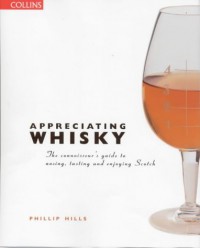 How to make enemies with Scotch whisky Taste is a sensation, a perception, an experience.Its a subjective impression of an objective reality, its purposeful:The means by which we sample our food, our judgement of it.Phillip Hill uses this as a starting point for his book Appreciating Whisky ( which he wanted to call " how to make enemies with Scotch whisky").He delves into the how & why scent plays a large part, for example the tongue has 9 thousand taste buds but the nose has between 50-100 million sense receptors.The way we use language & how our vocabulary mirrors our experience i.e the Inuit have dozens of words for snow where we have one, they make distinctions which we do not see but for them are life & death.Within this book he discusses,•Why whisky taste as it does.Chemistry- If we add 1 oxygen atom to methane we get not a gas but a liquid=Methyl alcohol•Why whisky taste as it does.The 5 materials- barley, water, yeast, peat & wood.•Why whisky taste as it does. The 5 processes-malting, mashing, brewing, distilling & maturing.•Why whisky taste as it does. Culture-which are broken down into 3 distinct areas, the culture of origin, corporate culture & the culture of consumption.Appreciating Whisky covers areas not usually addressed within the literature of whisky. It does this with amazing whit & with a depth of knowledge on all matters concerning malt whisky. That makes this book the only course work you need, choose a bottle & pick up this book. Its your primer, your professor & your class clown.
How to make enemies with Scotch whisky Taste is a sensation, a perception, an experience.Its a subjective impression of an objective reality, its purposeful:The means by which we sample our food, our judgement of it.Phillip Hill uses this as a starting point for his book Appreciating Whisky ( which he wanted to call " how to make enemies with Scotch whisky").He delves into the how & why scent plays a large part, for example the tongue has 9 thousand taste buds but the nose has between 50-100 million sense receptors.The way we use language & how our vocabulary mirrors our experience i.e the Inuit have dozens of words for snow where we have one, they make distinctions which we do not see but for them are life & death.Within this book he discusses,•Why whisky taste as it does.Chemistry- If we add 1 oxygen atom to methane we get not a gas but a liquid=Methyl alcohol•Why whisky taste as it does.The 5 materials- barley, water, yeast, peat & wood.•Why whisky taste as it does. The 5 processes-malting, mashing, brewing, distilling & maturing.•Why whisky taste as it does. Culture-which are broken down into 3 distinct areas, the culture of origin, corporate culture & the culture of consumption.Appreciating Whisky covers areas not usually addressed within the literature of whisky. It does this with amazing whit & with a depth of knowledge on all matters concerning malt whisky. That makes this book the only course work you need, choose a bottle & pick up this book. Its your primer, your professor & your class clown.
The Juno Charm (Salmon Poetry)
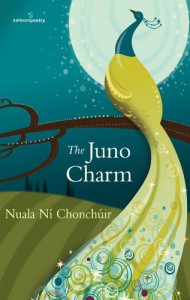 The Juno Charm by Nuala Ní Chonchúir (An Interview)Around the beginning of November I posted about a short story collection, Nude by Nuala Ní Chonchúir and learnt from a fellow blogger that she had a new collection of poetry out and was in the process of organising a virtual interview tour. Well that was me interested, I'd read a few of her poems on sites such as Poetry International and loved what I’d read, and I even posted one of them on my post of Nude. So I asked if I could take part, and Nuala kindly said Yes, sending me a copy of her new book “The Juno Charm”. This is a wonderful collection of poetry that investigates what it is to be alive, to love, to hurt. Nuala conjures up charms and incantations and calls on artists as varied as Frida Kahlo, Marc Chagall & Soozy Roberts, writers such as Basho, Kafka and Plath to craft a poetry that is so personal and intimate and yet resonates. Salvatore Quasimodo stated that “Poetry is the revelation of a feeling that the poet believes to be interior and personal, which the reader recognises as his own”. This collection is the perfect representation of that quote. Whilst taking part in this virtual tour, one of the facts about Nuala I learnt is that amongst the poets she admires is Sylvia Plath, who I’ve also been a big fan of & amongst the fantastic poems in the collection I noticed one that was based on the first line of one of my favourites (The Moon and the Yew Tree) by Plathhttp://parrishlantern.blogspot.com/2011/12/juno-charm-by-nuala-ni-chonchuir.html
The Juno Charm by Nuala Ní Chonchúir (An Interview)Around the beginning of November I posted about a short story collection, Nude by Nuala Ní Chonchúir and learnt from a fellow blogger that she had a new collection of poetry out and was in the process of organising a virtual interview tour. Well that was me interested, I'd read a few of her poems on sites such as Poetry International and loved what I’d read, and I even posted one of them on my post of Nude. So I asked if I could take part, and Nuala kindly said Yes, sending me a copy of her new book “The Juno Charm”. This is a wonderful collection of poetry that investigates what it is to be alive, to love, to hurt. Nuala conjures up charms and incantations and calls on artists as varied as Frida Kahlo, Marc Chagall & Soozy Roberts, writers such as Basho, Kafka and Plath to craft a poetry that is so personal and intimate and yet resonates. Salvatore Quasimodo stated that “Poetry is the revelation of a feeling that the poet believes to be interior and personal, which the reader recognises as his own”. This collection is the perfect representation of that quote. Whilst taking part in this virtual tour, one of the facts about Nuala I learnt is that amongst the poets she admires is Sylvia Plath, who I’ve also been a big fan of & amongst the fantastic poems in the collection I noticed one that was based on the first line of one of my favourites (The Moon and the Yew Tree) by Plathhttp://parrishlantern.blogspot.com/2011/12/juno-charm-by-nuala-ni-chonchuir.html
101 Whiskies to Try Before You Die
 This is a book that cuts through the clutter, decodes the marketing hype and gets straight to the point; whether from India, America, Sweden, Ireland, Japan or the hills, glens and islands of Scotland, here are the 101 whiskies that you really want to taste. http://parrishlantern.blogspot.com/2010/12/ian-buxton.html
This is a book that cuts through the clutter, decodes the marketing hype and gets straight to the point; whether from India, America, Sweden, Ireland, Japan or the hills, glens and islands of Scotland, here are the 101 whiskies that you really want to taste. http://parrishlantern.blogspot.com/2010/12/ian-buxton.html
2666
 2666 is an unfulfilled love story, its a world war 2 epic, it’s science fiction, it’s horror, reportage, it’s a thriller, it’s a comedy, it’s a vision of hell. It’s also the vision St Thomas Aquinas had of heaven, where the righteous can enjoy their beatitude & the grace of god more richly by being granted a perfect sight of the damned.2666 is a nightmare that is beautiful & a dream that haunts the edges of your waking hours, you could take a set square & compass to it & describe it logically, but all you would end up with is a pile of words, scattered across your floor. 2666 is massive, a dark nothing out of which everything explodes - life, death, love & hate. This is the start of the universe & the inertia born of its dying. This is the black heart of the sun.http://parrishlantern.blogspot.com/2010/07/2666-by-roberto-bolano-translated-by.html
2666 is an unfulfilled love story, its a world war 2 epic, it’s science fiction, it’s horror, reportage, it’s a thriller, it’s a comedy, it’s a vision of hell. It’s also the vision St Thomas Aquinas had of heaven, where the righteous can enjoy their beatitude & the grace of god more richly by being granted a perfect sight of the damned.2666 is a nightmare that is beautiful & a dream that haunts the edges of your waking hours, you could take a set square & compass to it & describe it logically, but all you would end up with is a pile of words, scattered across your floor. 2666 is massive, a dark nothing out of which everything explodes - life, death, love & hate. This is the start of the universe & the inertia born of its dying. This is the black heart of the sun.http://parrishlantern.blogspot.com/2010/07/2666-by-roberto-bolano-translated-by.html
Poetry of the Second World War: An International Anthology
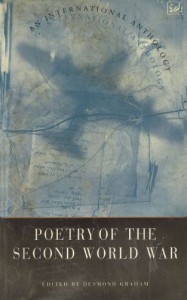 Hast Du Dich Verirrt? – Stevie Smith. My Child, my child, watch how he goes The man in Party coloured clothes. At one point in time it was considered that the horrors of the Second World War and the Holocaust had left poetry silenced, almost tongue-tied, as though the sheer monstrosity that man was capable of could not, or should not, be expressed in this art form. Like with most things, time has rendered that view obsolete, in fact revealed a necessity to bear witness, to lament and question all that was done by man to man. Whether this was Primo Levi, writing “You who live secure/ In your warm houses/ Who return at evening to find/ Hot food and friendly faces: Consider whether this is a man/ who labours in the mud”**, or Tamik Hara, who wrote “this is a human being/ look what an A-bomb has done to it/ the flesh swells so horribly/ and both men and women are reduced to one form”*** who survived Hiroshima only to commit suicide at the confirmation of the symptoms of “Atoms Disease” poetry not only found it’s voice, but found itself more than capable of conveying the “the vast and terrible sweep of the war”. Horoscope – Vladimir HolanEarly evening…. Cemetery…. And the wind sharp asbone splinters on a butcher’s block.Rust shakes its model out of tortured form.And above it all, above the tears of shame,the star has almost decided to confesswhy we understand simplicity only when the heart breaks,and we are suddenly ourselves, alone and fateless. Trans: Jarmilla & Ian MilnerThe poetry in this anthology highlights the utter abhorrence and sheer mundanity of conflict, whether on the frontline or the home front, Auschwitz or Hiroshima, the experience of war is apparent and central. From Osip Mandelshtam, writing in 1937 (a year before his death in Siberia), through Keith Douglas, killed in Normandy or Miklos Radnoti murdered on a forced march, this collection charts the course of the Second World War, through the voices of these poets.What makes this a great book is its sheer scope, it truly is an international compilation. One hundred and thirty poets from about twenty countries, from Australia, Japan, Europe, America and Russia show the scope of this collection and also reveal how universal is the need to articulate their experience, to record their thoughts and feelings – to witness.http://parrishlantern.blogspot.co.uk/2013/03/poetry-of-second-world-war.html
Hast Du Dich Verirrt? – Stevie Smith. My Child, my child, watch how he goes The man in Party coloured clothes. At one point in time it was considered that the horrors of the Second World War and the Holocaust had left poetry silenced, almost tongue-tied, as though the sheer monstrosity that man was capable of could not, or should not, be expressed in this art form. Like with most things, time has rendered that view obsolete, in fact revealed a necessity to bear witness, to lament and question all that was done by man to man. Whether this was Primo Levi, writing “You who live secure/ In your warm houses/ Who return at evening to find/ Hot food and friendly faces: Consider whether this is a man/ who labours in the mud”**, or Tamik Hara, who wrote “this is a human being/ look what an A-bomb has done to it/ the flesh swells so horribly/ and both men and women are reduced to one form”*** who survived Hiroshima only to commit suicide at the confirmation of the symptoms of “Atoms Disease” poetry not only found it’s voice, but found itself more than capable of conveying the “the vast and terrible sweep of the war”. Horoscope – Vladimir HolanEarly evening…. Cemetery…. And the wind sharp asbone splinters on a butcher’s block.Rust shakes its model out of tortured form.And above it all, above the tears of shame,the star has almost decided to confesswhy we understand simplicity only when the heart breaks,and we are suddenly ourselves, alone and fateless. Trans: Jarmilla & Ian MilnerThe poetry in this anthology highlights the utter abhorrence and sheer mundanity of conflict, whether on the frontline or the home front, Auschwitz or Hiroshima, the experience of war is apparent and central. From Osip Mandelshtam, writing in 1937 (a year before his death in Siberia), through Keith Douglas, killed in Normandy or Miklos Radnoti murdered on a forced march, this collection charts the course of the Second World War, through the voices of these poets.What makes this a great book is its sheer scope, it truly is an international compilation. One hundred and thirty poets from about twenty countries, from Australia, Japan, Europe, America and Russia show the scope of this collection and also reveal how universal is the need to articulate their experience, to record their thoughts and feelings – to witness.http://parrishlantern.blogspot.co.uk/2013/03/poetry-of-second-world-war.html
Caesarion
 In the port of Alexandria, a very long time ago, Julius Caesar impregnated then abandoned Cleopatra. The child of their union – groomed for greatness by his devoted mother but destined for tragedy – was called Caesarion. Little Caesar.History repeats itself, first as tragedy, then as farce. In our time another boy, Ludwig, is born in Alexandria and again the father flees, leaving the boy and his mother to move on. She, Marthe, is stormy and vain. She will not rest until she finds their ideal home – which needs to be both dramatic and cheap, and so they end up living in some crumbling old house on the cliff tops of Alburgh in Suffolk - living in a constant state of awareness that the sea could take away all that they have.The lines written above are either direct quote or me paraphrasing the back cover of this book. We learn all this through Ludwig, who has returned to Alburgh as an adult for a funeral of his once neighbour (and the man who originally sold his mother the house). Ludwig has taken a job playing piano at a local hotel whilst waiting for the funeral & deciding his next move. At the bar of this hotel he meets this woman, Linny Wallace and over a period of a few days he tells her his life story. It’s through this medium we trace his life story from the young child in Alexandria & the disappearance of his father, through the journey back to Holland where his mother was born & onto the crumbling house on the cliff top, where they live until its collapse & his mother moves to Los Angeles. We learn that his father was an Artist, though all he appeared to do is destroy & his mother was originally a porn star. We follow this through the eyes of Ludwig, learning about the tug and pull of his claustrophobic relationship with his mother of a strange interdependence that’s part love, part horror, of him trying to discover his own father within himself. This leads to the search & discovery of his father, with it comes the realisation of how much he is his mothers son & how little of his father there is. We also follow the last days he has with his mother and watch as parental roles reverse and what was considered solid can crumble, then all that’s left is to fathom the pieces.http://parrishlantern.blogspot.co.uk/2012/06/little-caesar-caesarion.html
In the port of Alexandria, a very long time ago, Julius Caesar impregnated then abandoned Cleopatra. The child of their union – groomed for greatness by his devoted mother but destined for tragedy – was called Caesarion. Little Caesar.History repeats itself, first as tragedy, then as farce. In our time another boy, Ludwig, is born in Alexandria and again the father flees, leaving the boy and his mother to move on. She, Marthe, is stormy and vain. She will not rest until she finds their ideal home – which needs to be both dramatic and cheap, and so they end up living in some crumbling old house on the cliff tops of Alburgh in Suffolk - living in a constant state of awareness that the sea could take away all that they have.The lines written above are either direct quote or me paraphrasing the back cover of this book. We learn all this through Ludwig, who has returned to Alburgh as an adult for a funeral of his once neighbour (and the man who originally sold his mother the house). Ludwig has taken a job playing piano at a local hotel whilst waiting for the funeral & deciding his next move. At the bar of this hotel he meets this woman, Linny Wallace and over a period of a few days he tells her his life story. It’s through this medium we trace his life story from the young child in Alexandria & the disappearance of his father, through the journey back to Holland where his mother was born & onto the crumbling house on the cliff top, where they live until its collapse & his mother moves to Los Angeles. We learn that his father was an Artist, though all he appeared to do is destroy & his mother was originally a porn star. We follow this through the eyes of Ludwig, learning about the tug and pull of his claustrophobic relationship with his mother of a strange interdependence that’s part love, part horror, of him trying to discover his own father within himself. This leads to the search & discovery of his father, with it comes the realisation of how much he is his mothers son & how little of his father there is. We also follow the last days he has with his mother and watch as parental roles reverse and what was considered solid can crumble, then all that’s left is to fathom the pieces.http://parrishlantern.blogspot.co.uk/2012/06/little-caesar-caesarion.html




 1
1
 1
1